
Live Football Commentating Online Course
Delivered in Beaconsfield, UK, 16-17 September 2021, Commitment: 08:30-12:00 (GMT).
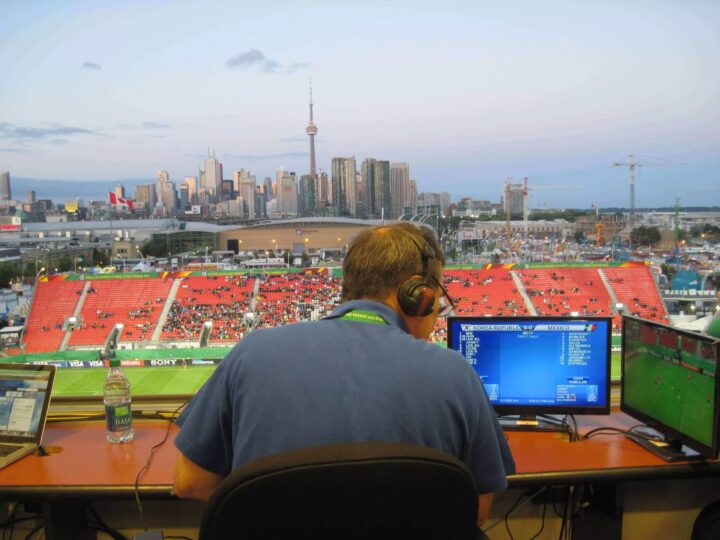
For more information regarding the course in London, please visit the NFTS Website by clicking on the button.
Course Details
In Partnership with the National Film & Television School 
Date: 16-17 September 2021
Commitment: 08:30-12:00 (GMT)
Number of Places: 8-10
Duration: 2 Days
Course Fee: 300£ (Freelance rate) 350£ (Corporate rate)
* Only shortlisted applicants will be invited to participate in this course.
*In case of non-participation we follow a non-refund policy. For avoidance of doubt in case of non-participation no refund will be done by Broadcast Academy to the user. If Broadcast Academy cancels the course, participants are entitled to a full refund.
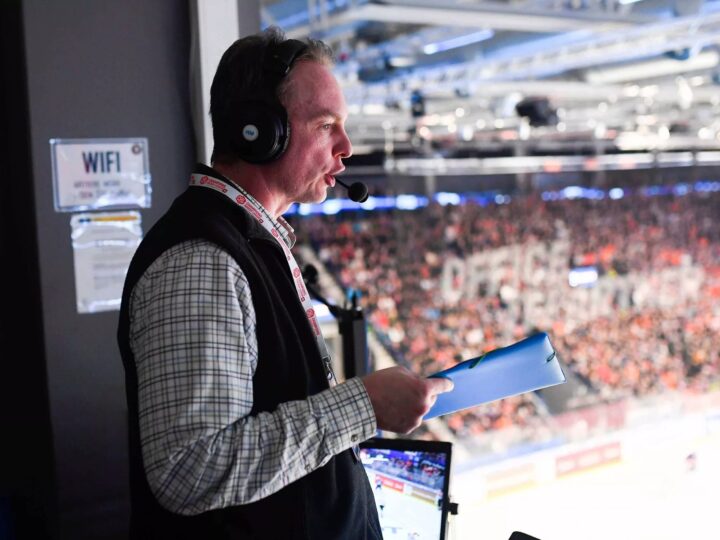
Course Information
This online course was aimed at those who have started their career as sports commentators and wish to be the voice that stands out. If you wanted to hone your skills and ability to cope with mid and high football leagues, then this course was for you.
The course was run initially as a group session and then commentators prepared and performed training by delivering off tube commentary of a football match.
The two-day online training had pre-recorded and live sessions. Participants were given case-studies and project work and benefitted from direct interaction with the expert.
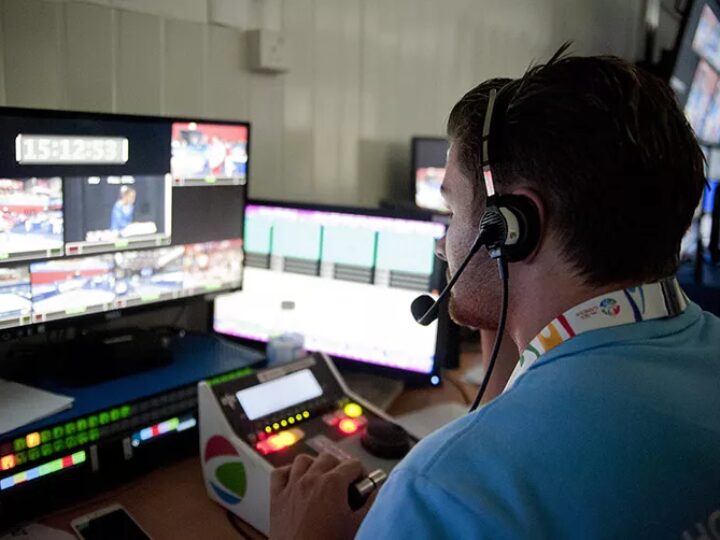
Course Objectives
- To master the art of radio and TV commentary
- To add value to a viewer’s experience through insight and information
- How to prepare for a football event
- How to modulate and maximise your voice
- How to work efficiently with producers and directors
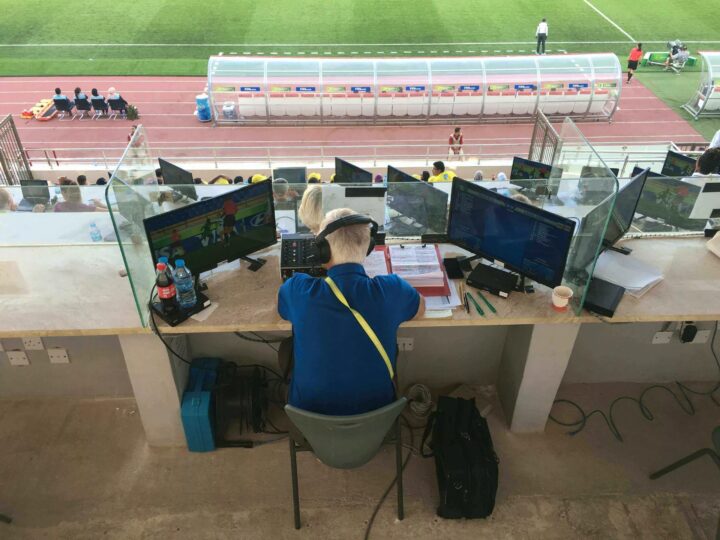
Goals
- Have a better understanding of the real objectives of sports commentary
- Have a much broader understanding of the art of commentary
- Understand what the Broadcaster wants from a good Commentator
- Be able to prepare for commentary more effectively with the tools to develop their own system of notes
- Be able to create their own commentary style and feel more confident in delivering effective storytelling commentary
- Be confident and efficient in storytelling
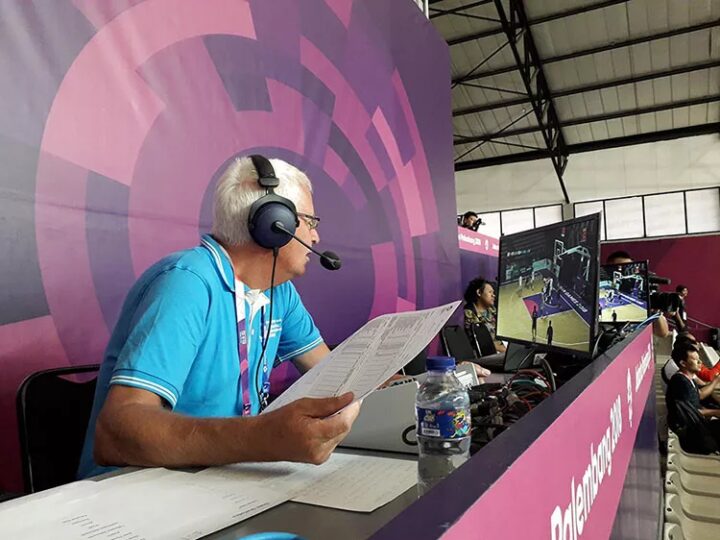
Sample Course Plan
Day 1
- Real objectives of television sports commentary
- History of sports commentary – Radio to television
- Different commentary styles around the world – Contrasting styles according to countries (e.g. USA, South Africa, Japan, Scandinavia, etc.)
- Telling a story
- Informing & updating viewers and fans
- Enhancing the viewing experience – Real objective for every commentator
- Introduction to commentary
- Understanding the role and subject matter
- Developing one’s own personality
- Pronunciation – not prounounciation
- Spontaneity – hallmark of good commentary
- Art of interviewing, listening (i.e. Samaritans)
- Develop individual style and personality
- Knowing when to speak
- The art of silence – golden rules
- Voice modulation – Pitch tone and impact, light and shade, plus projection
- Ad-libbing
- Brevity
- How to pitch voice as match evolves
- Role models – seek to emulate not imitate
- You are the eyes of all those watching and listening to YOU
- Preparation
- Match preparation – equal attention whether a World Cup final or a non-league match
- Preparation, statistics, notes
- Information – social media, Internet, books etc.
- Contacts – Pool of commentators worldwide
- Managers/players (protected species) – building contacts
- Club media officers
- When to script and when not to script
- News awareness (e.g. Bradford Fire, Heysel etc.)
- Statistics – what and when to use
- Stats and commentary notes
- Creating anticipation
- Personal opinion – with or without expert co-commentator
- Working with a director, basic talkback
- Pre-match contact with TV production crew
- Individual commentary stints off tube and group review
- Lead vs Colour commentary
- General facts and figures as opposed to personal player information
- Neatness – easy-to-read notes
- Live throws to breaks, promos, twitter messages, touchline reporters etc.
- Golden rules for monitor use – particularly in off-tube situations
- Workspace in commentary position
- Inside or outside commentary position preference
- Duty to players, officials, viewers
- Off-tube commentaries – different techniques
- Using equipment’s
- Talkback, PA’s – ability to combine speech with listening
- Using the lazy button for talkback
- Use of monitor
- Microphone techniques ─ Lip ribbon vs headset
Day 2
- On match day and during the match
- Managing commentary during a poor game. How to keep it interesting without criticism
- Being ever mindful of subsequent highlights packages – brevity is best Edit points
- Dangers of too many statistics (Have but don’t use)
- Danger of trying to anticipate – seeking glory through prediction
- Use of clichés (some unavoidable in sport, even expected e.g. “giant killers”) use sparingly and mindfully
- What to do when you get it wrong (factually or by insinuation)
- What to do when you don’t know what’s happening
- Don’t make stupid, irrelevant comments. Don’t try to be clever
- How to assess the flow of the game
- How to react when things go wrong, technically or visually
- Switching to reporter role in mid-commentary
- Analysing one’s own performances
- Taking advice
- Individual commentary stints off tube and group review
- Pre-match checks on routes to stadiums, entry gates, commentary areas
- Meeting the Director, the Producer
- Hitting cues from a Production Assistant/Continuity
- Language barriers – working with foreign crews
- Story telling techniques during a match
- Discussion with experts during match
- Live throws to breaks, promos, twitter messages, touchline reporters etc.
- Different media outlets – club websites, videos, Twitter
- How to go with the flow of the game
- Editing points for highlights
- Chemistry between commentator and co-commentator/expert
- Listening to co-commentator, studio guests, pre-match features
- Running orders – look for times, durations, changes
- Applications for passes, accréditations, visas etc.
- TV compounds, media centres
- Sound Professionals – perfectionists
- Exercises & Case Studies
- Commentate on a match provided by the trainer
- Recording of 15 minutes by each participant
- Individual review, analysis, and feedback
- Review of the four days learning. What have we learnt?
- Evaluation of the session
- Conclusion & Q&A
Please Note: The above course agenda is for reference purposes only. The sessions can be tailored to the precise requirements of the participants.
Our Expert
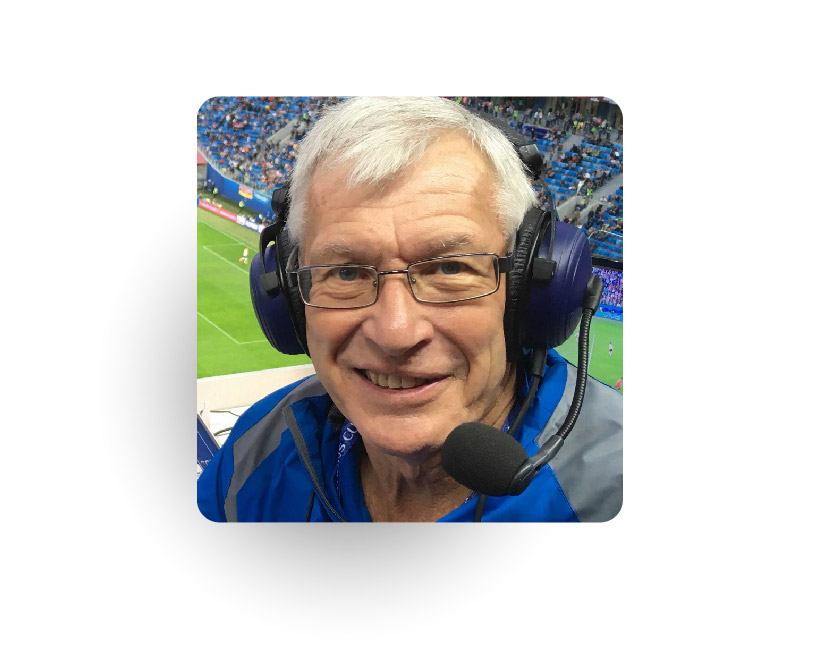
John Helm, Commentator
John Helm has been involved in journalism since leaving school in 1959, working on regional and national newspapers.
A former Head of Outside Broadcasts for the BBC, he has commentated on more than 20 sports during a radio and television career spanning almost 50 years. John has commentated at Olympic Games, Commonwealth Games, Asian Games, nine FIFA World CupTM events, and numerous golf events around the world.
He has also been involved with the FIFA Broadcast Academy in the past, conducting courses in numerous African countries. Perhaps best remembered for his commentary on the 1985 Bradford City fire disaster, John has won recognition for his work including a Lifetime Achievement Award from the Royal Television Society. He was included in the Guinness Book of Records for being able to name all 92 clubs in the English Football League in 26 seconds.

Andreas Evagora, Executive Producer and Commentator
Andreas Evagora has worked in sports media since covering the 1998 FIFA World Cup FranceTM as a news agency reporter. Based in France, he currently produces and commentates on events for sports fans around the world.
Recent projects include 2020 Olympic Games commentary management, Quality Control for FIFA World CupTM qualifying matches across 40 African countries and match commentary for the UEFA EURO 2020 and PSG.TV.
He has turned his hand to a range of sports, including tennis, artistic gymnastics, volleyball, ski jumping and shooting as a commentator, live producer and project manager.